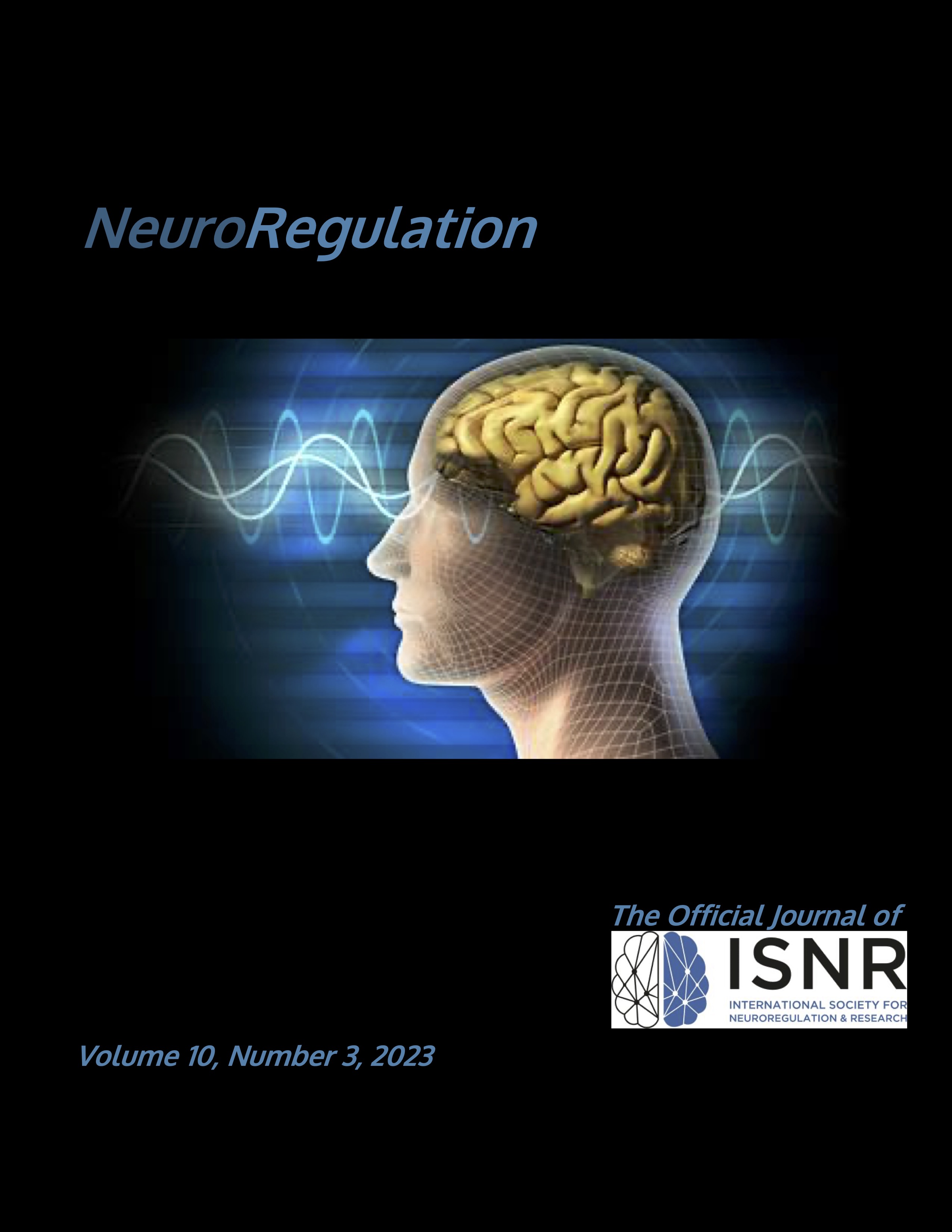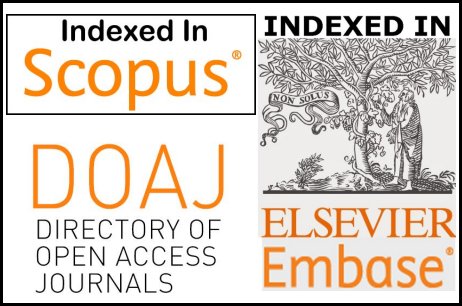A Preliminary Study Investigating the Acquisition of valid qEEG Data While Wearing a Virtual Reality (VR) Headset
DOI:
https://doi.org/10.15540/nr.10.3.170Keywords:
qEEG, Virtual Reality, VR therapyAbstract
The use of virtual reality (VR) therapy is being utilized and promoted for a wide range of treatment applications. Yet, the majority of clinical evidence that supports the efficacy of VR treatment has been established utilizing reports of subjective outcome variables, such as rating scales or a reduction of symptoms reported by the patient. Instead, the present study supports the use of quantitative electroencephalography (qEEG) as a more precise and objective method for assessing treatment efficacy involving the use of VR-based treatments. Although a few studies have attempted to establish physiological evidence from qEEG recordings to strengthen the efficacy of pre-post treatment effects for VR-based treatments, these attempts have been based upon very small sample sizes or case studies. Therefore, to the best of our knowledge, prior studies have failed to uniformly account for ingenuine treatment effects that could arise from merely wearing a VR headset while acquiring qEEG. The current preliminary study sought to systematically measure any potential confounding effects that wearing a VR headset could produce by measuring and comparing the baseline qEEG recordings for the eyes-open, resting condition (staring at a dot) with and without the VR headset for 28 participants. The present results revealed very minimal significant differences between the two conditions when analyzed collectively and no significant differences for the male participants. The implications of these findings are discussed and provide preliminary support for confidently reporting qEEG efficacy data involving the use of a VR headset. Additionally, the current study is believed to have successfully established a valid and standardized approach for reliably obtaining active or real-time qEEG data while wearing a VR headset in order to confidently report the physiological effects of VR immersion on electrical brain activity.
References
American Psychiatric Association. (2021, June 21). Expanding mental health users for virtual reality. https://www.psychiatry.org/News-room/APA-Blogs/Expanding-Mental-Health-Uses-for-Virtual-Reality
Baceviciute, S., Terkildsen, T., & Makransky, G. (2021). Remediating learning from non-immersive to immersive media: Using EEG to investigate the effects of environmental embeddedness on reading in virtual reality. Computers & Education, 164, 104122. https://doi.org/10.1016/j.compedu.2020.104122
Cattan, G., Andreev, A., Mendoza, C., & Congedo, M. (2018). The impact of passive head-mounted virtual reality devices on the quality of EEG signals. 2018 VRIPHYS Workshop on Virtual Reality Interaction and Physical Simulation. https://doi.org/10.2312/vriphys.20181064
Daneshvar, D. H., Yutsis, M., Baugh, C. M., Pea, R. D., Goldman, S., Grant, G. A., Ghajar, J., Sanders, L. M., Chen, C. L., Tenekedjieva, L.-T., Gurrapu, S., Zafonte, R., & Sorcar, P. (2021). Evaluating the effect of concussion-education programs on intent to report concussion in high school football. Journal of Athletic Training, 56(11), 1197–1208. https://doi.org/10.4085/509-20
Food and Drug Administration (FDA). (2021, November 16). FDA authorizes marketing of virtual reality system for chronic pain reduction. https://www.fda.gov/news-events/press-announcements/fda-authorizes-marketing-virtual-reality-system-chronic-pain-reduction
Gurr, H. & Laitz, E.K. (2023). Clinical evidence of virtual reality in mental health treatment [Webinar]. [Online]. Amelia Virtual Care sponsored by American Psychiatric Association, April 21, 2023
Hertweck, S., Weber, D., Alwanni, H., Unruh, F., Fischbach, M., Latoschik, M. E., & Ball, T. (2019). Brain activity in virtual reality: Assessing signal quality of high-resolution EEG while using head-mounted displays. 2019 IEEE Conference on Virtual Reality and 3D User Interfaces (VR), Osaka, Japan (pp. 970-971). https://doi.org/10.1109/VR.2019.8798369
Hufnal, D., Johnson, T., Yilderim, C., & Schofield, D. (2021). Impact of VR and desktop gaming on electroencephalogram (EEG) ratings. 2021 International Conference on Electrical, Communication, and Computer Engineering (ICECCE), Kuala Lumpur, Malaysia. https://doi.org/10.1109/icecce52056.2021.9514188
Tarrant, J., Viczko, J., & Cope, H. (2018). Virtual reality for anxiety reduction demonstrated by quantitative EEG: A pilot study. Frontiers in Psychology, 9, Article 1280. https://doi.org/10.3389/fpsyg.2018.01280
Tran, Y., Austin, P., Lo, C., Craig, A., Middleton, J. W., Wrigley, P. J., & Siddall, P. (2022). An exploratory EEG analysis on the effects of virtual reality in people with neuropathic pain following spinal cord injury. Sensors, 22(7), 2629. https://doi.org/10.3390/s22072629
Tremmel, C., Herff, C., Sato, T., Rechowicz, K., Yamani, Y., & Krusienski, D. J. (2019). Estimating cognitive workload in an interactive virtual reality environment using EEG. Frontiers in Human Neuroscience, 13, Article 401. https://doi.org/10.3389/fnhum.2019.00401
Xu, X., & Sui, L. (2021). EEG cortical activities and networks altered by watching 2D/3D virtual reality videos. Journal of Psychophysiology, 36(1), 4–12. https://doi.org/10.1027/0269-8803/a000278
Downloads
Published
Issue
Section
License
Copyright (c) 2023 Fernando Cavallo, Bill Brubaker, Ellie Bruckner, Sofia Castro

This work is licensed under a Creative Commons Attribution 4.0 International License.
Authors who publish with this journal agree to the following terms:- Authors retain copyright and grant the journal right of first publication with the work simultaneously licensed under a Creative Commons Attribution License (CC-BY) that allows others to share the work with an acknowledgement of the work's authorship and initial publication in this journal.
- Authors are able to enter into separate, additional contractual arrangements for the non-exclusive distribution of the journal's published version of the work (e.g., post it to an institutional repository or publish it in a book), with an acknowledgement of its initial publication in this journal.
- Authors are permitted and encouraged to post their work online (e.g., in institutional repositories or on their website) prior to and during the submission process, as it can lead to productive exchanges, as well as earlier and greater citation of published work (See The Effect of Open Access).











